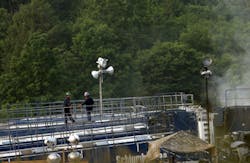EPA presents guidance on permitting use of diesel in fracking
The U.S. Environmental Protection Agency (EPA) has presented its draft guidelines for states regarding issuing permits to drilling companies that use diesel fuel in fracking oil and natural gas wells. Although the federal agency cannot regulate under the Safe Drinking Water Act, it is empowered to regulate and oversee operations that involve the use of diesel fuel.
The EPA's revised underground injection control program permitting guidelines propose updated requirements for issuing permits, as well as new technical recommendations for wells and a detailed description of diesel fuels for permitting. In addition, the guidance defines the term diesel fuel by reference to five chemical abstract services registry numbers, the EPA explained.
RELATED: Scientists debate link between Oklahoma earthquakes, fracking wastewater
As part of its guidance, the agency stated that permits on hydraulic fracturing operations that use diesel fuels will be made individually, on a case-by-case basis, taking into account the specific facts and circumstances of injection activities and applicable regulations and laws.
The EPA has started a consultation on its proposals, so public comments are encouraged. The agency pointed out that it was working with individual states and with stakeholders to ensure that unconventional methods for extracting oil and gas are safe in terms of public health and the environment. This is why most of the recommended practices in the guidance are consistent with those regarding fracking operations as a whole, the EPA said.
